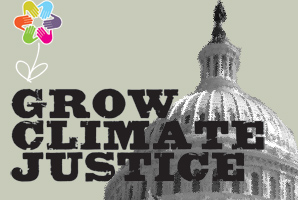
The state of play in the USA on climate justice
By guest writer Walter E. Grazer, Special Adviser for National Religious Partnership for the Environment
US politics surrounding climate change remains contentious and uncertain. While the US House of Representatives passed climate legislation in the summer of 2009, all eyes are now on the US Senate that is in a state of virtual political paralysis. Democrats and Republicans are unable to find common ground thus far on any major issue, whether it is health care overhaul, finance reform, immigration or climate change.
Impending fall elections for Congress only adds to the pressure to act on climate change within the next few weeks or months. While the politics of climate change is complicated, 2010 is the best time for action rather than handing this off to a new Congress in 2011. Action is less likely in 2011 given the potential new make-up of a Congress that many fear is likely to be less favourable to addressing climate change.
Senators John Kerry, a Democrat; Joe Lieberman, an independent who caucuses with the Democrats; and Lindsay Graham, a Republican, are leading the effort to craft comprehensive climate legislation, meeting weekly to hammer out an agreement with colleagues in both parties. Getting an agreement among their colleagues is proving to be very difficult in the current political and policy climate.
Despite the challenges and the odds, Kerry, Lieberman and Graham seek to offer proposed legislation shortly after the Easter recess. They hope their proposal will garner enough support to pass the Senate. Current expectations are that their proposal will phase in emissions controls on the utility sector first, while delaying controls on manufacturing until around 2018. In addition, their legislation will most likely offer significant support for nuclear energy and off shore oil and gas production.
While the climate debate rages, the religious community collectively is focused on two objectives: offsetting the impacts from expected rises in energy prices on low income people in the United States; and addressing the adaptation needs of the most vulnerable developing countries.
In particular, the United States Conference of Catholic Bishops along with its ecumenical and interfaith partners—the National Council of Churches, the Evangelical Environmental Network and the Coalition on the Environment and Jewish Life– are leading an effort to address the link between climate change and poverty in any comprehensive climate legislation. Together, they have championed the effort to secure a strong US international adaptation programme with sufficient funds to help the most vulnerable developing countries. They are urging Congress and the Administration to support a US bi-lateral and multilateral contribution to international adaptation starting at $3.5 billion in 2012 ramping up to $7 billion by 2020.
Given the severity of the economic crisis in the United States, the leadership of the religious community in support of the adaptation needs of the most vulnerable developing countries is critical. Working with Catholic Relief Services, Catholic Charities USA and other faith based relief and development agencies, the religious community is fully committed to continuing to be a voice for the voiceless in the US climate debate.
Views expressed are those of the writer and not of Caritas Internationalis
